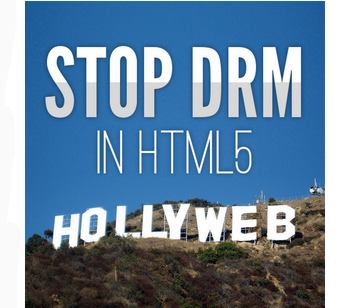| Protest Against Adding DRM APIs To HTLM5 |
| Written by Stone Tapes | |||
| Wednesday, 17 April 2013 | |||
|
The Free Software Foundation is urging its members to sign a petition to protest moves to incorporate Digital Rights Management technologies into the next generation of core web technologies. The call is to back the latest drive on the Defective By Design website with the headline "Tell W3C: We don't want Hollyweb" This aims to collect 50,000 signatures to a petition that asks the World Wide Web Consortium (W3C) and its member organizations to reject a propsal which would incorporate support for DRM into HTML5. The deadline for the petition is May 3rd, 2013, which is this year's International Day Against DRM.
Since it started campaigning in 2006, DefectiveByDesign has raised awareness of the way in which DRM, which they use to stand for "Digital Restrictions Management", rather than the usual "Digital Rights Management" deprives users of full access to movies, music, literature and software. The current crusade is to counter a proposal put forward to the W3C's HTML5 Working Group for Encrypted Media Extensions which would extend HTMLMediaElement by providing APIs to control playback of protected content. According to the draft submission: This specification does not define a content protection or Digital Rights Management system. Rather, it defines a common API that may be used to discover, select and interact with such systems as well as with simpler content encryption systems. Implementation of Digital Rights Management is not required for compliance with this specification: only the simple clear key system is required to be implemented as a common baseline. However, given that its editors are from Google, Microsoft and Netflix and the fact that the BBC is a keen supporter, this specification is being seen as an attempt to "sneak digital restrictions into every interaction we have online."
The wording of the petition clarifies what Defective By Design sees as the threat. It argues that the Extended Media extensions proposal (EME) would: ...endorse and enable business models that unethically restrict users, and it would make subjugation to particular media companies a precondition for full Web citizenship. ...hamper interoperability by encouraging the proliferation of DRM plugins. The petition also says that accepting EME: would fly in the face of the W3C's principle of keeping the Web royalty-free — this is simply a back door for media companies to require proprietary player software. There are rights and wrongs on both sides of the DRM debate. Many would argue that keeping the Web royalty free denies recompense to individual artists, musicians and writers as well as to Hollywood and media moguls. Even so a petition that signals reservations seems like a worthwhile idea especially in light of the argument put forward by Electronic Frontier Foundation (EFF) about how the EME could limit interoperability. EFF explains that instead of implementing a common standard for content decryption modules (CDMs. EME) it allows for proliferation of third-party CDMs. This could produce: an explosion of new mutually-incompatible software and of sites and services that can only be accessed by particular devices or applications. Perhaps we should be asking W3C to do more rather than less towards creating web standards for DRM. Protecting the rights of creators is not a priori a bad thing but it has to be done in the right way to ensure that it isn't misused or overused.
More InformationTell W3C: We don't want Hollyweb Encrypted Media Extensions Editor's Draft Electronic Frontier Foundation - Keep DRM out of W3C standards Related ArticlesTo be informed about new articles on I Programmer, install the I Programmer Toolbar, subscribe to the RSS feed, follow us on, Twitter, Facebook, Google+ or Linkedin, or sign up for our weekly newsletter.
Comments
or email your comment to: comments@i-programmer.info
|
|||
| Last Updated ( Wednesday, 17 April 2013 ) |




